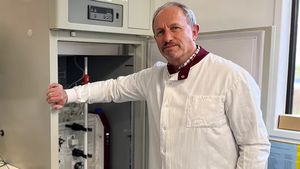Rising temperatures will compound serious health risks as Birmingham bin strikes continue, warns microbiology expert
As Birmingham continues to grapple with uncollected waste piling up on its streets, a microbiologist from Birmingham City University (BCU) is warning of the serious health risks posed by rotting rubbish as temperatures begin to rise.
Watch more of our videos on ShotsTV.com
and on Freeview 262 or Freely 565
Dr Martin Goldberg, Senior Lecturer in Biomedical Sciences, has voiced concern over the potential biohazards accumulating in residents’ black bags, stating that the current situation is no longer just an inconvenience.
“When people throw out their household rubbish, it often includes raw food waste, soiled nappies and dog-waste bags,” Dr Goldberg explained.

“These items are frequently contaminated with naturally occurring pathogens.
“Under the current conditions — warm, moist, and stagnant environments — these pathogens can multiply rapidly, increasing the risk of disease.”
Dr Goldberg also warns that the health implications are significant and wide-ranging.
“Decomposing waste provides ideal conditions for flies to breed. These flies can then transfer harmful bacteria onto food or kitchen surfaces, heightening the risk of foodborne illnesses in the home.”
“Rats are another major and well-reported issue,” he continues. “They are not just a nuisance; they are known carriers of a range of serious diseases such as leptospirosis, which can be transmitted to humans.
“Even more troubling, rats are frequently hosts to fleas and ticks, which themselves are capable of spreading historically deadly infections like Yersinia pestis—the bacteria responsible for the plague—as well as murine typhus (Rickettsia typhi), flea-borne spotted fever, and cat scratch disease (Bartonella henselae).
“Additionally, rats can carry tapeworms and other pathogens, which can be dangerous to household pets such as cats who may feed on the growing rat population.”
Dr Goldberg also highlights the often-overlooked dangers of waste leakage.
“Liquid run-off from bin bags is beginning to seep onto pavements, where it can be picked up on shoes, pets’ paws, or hands,” he said.
“From there, it can easily be tracked into homes and onto surfaces. It’s a contamination pathway that is both subtle and dangerous.”
The current bin strikes, which have left large sections of the city with weeks of accumulated rubbish, have already sparked political discussions — but Dr Goldberg stresses that the microbial concerns must not be ignored.
As the situation persists, he is urging the public to take preventative measures where possible.
“Make sure you keep rubbish tightly sealed and ideally out of the sun, reduce your contact with any waste, and wash your hands thoroughly after any exposure,” he said.
“The longer this goes on, the more serious the health implications become. This is no longer about foul smells or full bins—it’s about preventing a slow-moving public health crisis.”




